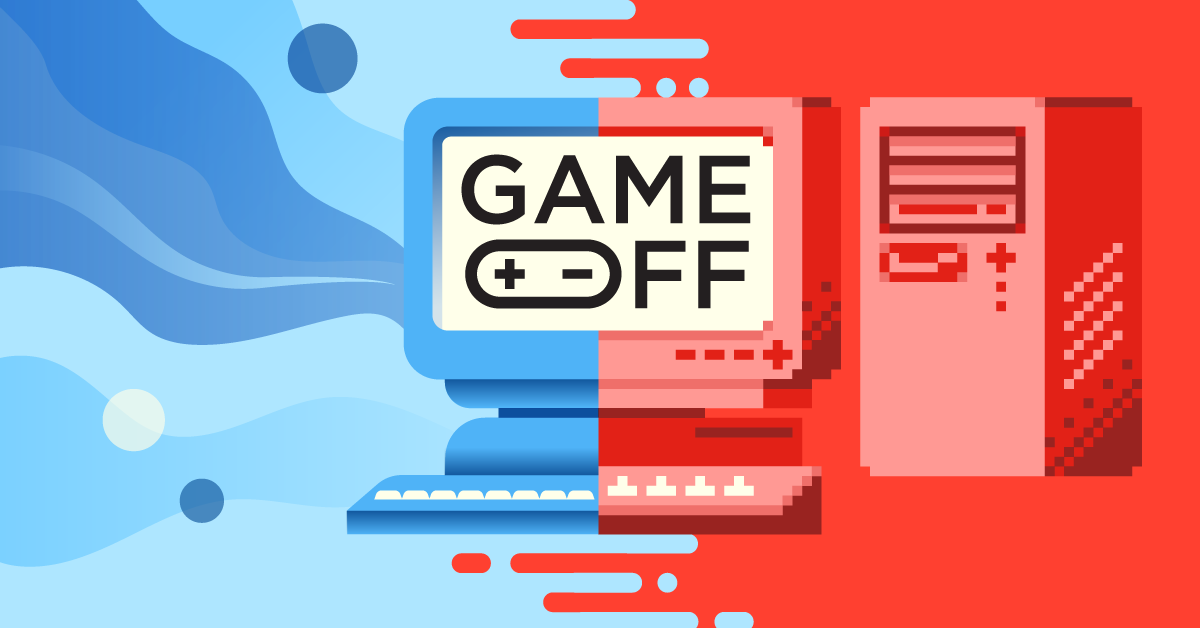And this bold statement is not (only) marketing speak, the winner of GitHub Game Off 2017 was indeed a Godot-made game by Securas, Daemon vs Demon.
The 2018 edition of the month-long jam focusing on free and open source game development tools is about to start again on November 1st. Check the details on itch.io: Game Off 2018.
Edit: The Game Off 2018 theme is HYBRID! Have fun!
This is a great opportunity to discover Godot if you’re not familiar with it yet, get some more experience if you know it already, or get to know some of the other awesome free and open source game engines or frameworks out there such as Phaser, LÖVE or LibGDX.
And make sure to review the tons of available free and open source tools that could be useful for your project, such as Blender, Krita, GIMP, LMMS… and many more! Our contributor Calinou maintains a very useful list of FOSS game development tools and resources, awesome-gamedev.
When you share screenshots or videos of your game on social media, please use the #GitHubGameOff hashtag as well as #GodotEngine, to show the community what great projects are being worked on!
We hope that many Godot users will take part in the jam, and maybe, like in 2017, win it! At the very least we wish you all the best of luck and a lot of fun :)
Getting started with Godot
If you’re new to Godot, or started only recently, you might be looking for good resources to learn how to make games with our engine. The following is a short list of recommended resources, but feel free to use different ones from the wealth of video tutorials and demos that have been produced by the Godot community over the years.
Installing the engine
First of all, head over to the Download page to get the latest stable version of Godot – you can also install it from itch.io or Steam.
For new users, we recommend the “classical” build (as opposed to the “Mono” build with C# support, currently in alpha) and the GDScript language, which you should be able to learn very fast. Experienced C# users are of course welcome to try their hand at the Mono build, just make sure to have the Mono SDK in version 5.12.x installed.
Experienced Godot users may also want to try the nightly builds of the upcoming Godot 3.1, currently at the alpha stage. An official 3.1 alpha 2 build should be published in coming days. Keep in mind that it’s software in development and that bugs could hinder your productivity or capacity to export stable builds to submit to the jam, so proceed with caution :)
Official documentation
The main resource is Godot’s official documentation.
It contains many tutorials about the different features of the engine, including a step by step tutorial which should give you a good introduction to the core concepts of the engine such as nodes, scenes, instancing and scripting.
The official documentation also includes the Class Reference, where the API of the various nodes is documented. It’s also included directly in the editor when you press the “Classes” and “Search Help” buttons in the script editor.

Community tutorials
Community members have produced a great number of video tutorials for Godot 3.0, as well as quite a few text-based tutorials for those who prefer that. Some are standalone tutorials about a given feature or concept, while others are series that will lead you through making a simple game from A to Z.
Have a look at this page for a list of recommended resources - but make sure to use the official documentation too, especially as many of these tutorial makers are contributing to the docs.
Official demos and community projects
There are many official demos included in this repository, and also available directly from the Asset Library when you start Godot. There are simple games such as Pong, Dodge the Creeps (from the docs), 2D and 3D platformers, a space shooter, an RPG, etc., as well as many small demos meant to showcase how to use a given feature, such as particles, screen space shaders, lights, navigation meshes, etc.
Next to those, there are many free and open source community projects that you can learn from, such as those made for our previous Godot jam in June 2018. Check also games made for the first two Godot Wild Jams as many come with source included. You can use GitHub’s Explore feature to find repositories tagged with Godot, or GDScript, or search for trending GDScript projects.
Community communication platforms
And of course you are not alone to learn how to use Godot! We have many community platforms where you can discuss with other users and learn from them. You can pick the one(s) you like best and should always find nice users to interact with.
Don’t miss the Godot Questions & Answers, which likely already has answers for some of the questions you might be asking yourselves. If not, don’t hesitate to ask your question, being both concise and specific, and you should quickly get some help.
Finally, if you think that you hit a bug in the engine, please report it on GitHub. Make sure to follow the proposed issue template (filled in automatically) to help us help you.
Have a lot of fun with GitHub Game Off 2018!
